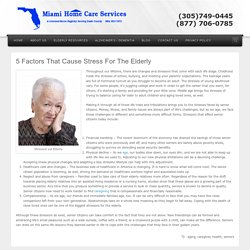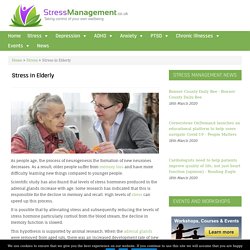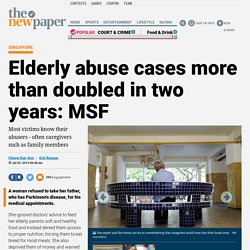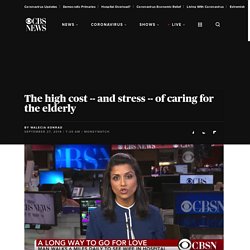

When a human is faced with threat, it activates a larger quantity of stress hormones such as cortisol, epinephrine and norepinephrine. This hormones are said to increase our alertness and blood pressure. However in large quantity, it may affect the health.
Stress: Why does it happen and how can we manage it?
5 Factors That Cause Stress For The Elderly. Stressed out Elderly Throughout our lifetime, there are changes and stressors that come with each life stage.

Childhood holds the stresses of school, bullying, and meeting your parents’ expectations. The teenage years are full of hormonal tumult as you struggle to become an adult. The stresses of young adulthood vary. For some people, it’s juggling college and work in order to get the career that you want; for others, it’s starting a family and providing for your little ones. Making it through all of those life trials and tribulations brings you to the stresses faced by senior citizens. Financial hardship – The recent downturn of the economy has drained the savings of those senior citizens who were previously well off, and many other seniors are barely above poverty levels, struggling to survive on dwindling social security benefits.Physical decline – As we age, our bodies slow down, our eyes dim, and we are not able to keep up with life like we used to.
TODAYonline. SINGAPORE — A Singaporean senior citizen aged 65 and above and living alone needs about S$1,379 a month to meet basic standards of living.

The amount increases to S$1,721 for those aged between 55 and 64. As for couples aged 65 and older, they need S$2,351 a month. That is what a team of researchers found after conducting focus-group discussions with more than 100 people who come from various ethnic groups, housing types and educational levels. Almost nine in 10 (89 per cent) were aged 55 and above. Led by Assistant Professor Ng Koe Hoe from the National University of Singapore’s Lee Kuan Yew School of Public Policy, the study seeks to find out the amount of money needed for older people to achieve a basic standard of living in Singapore today. In the 63-page report released on Wednesday (May 22), the researchers said that the budgets they developed do not only cover expenses for food, transportation and accommodation.
Stress in Elderly, Stress and Aging. As people age, the process of neurogenesis the formation of new neurones decreases.

As a result, older people suffer from memory loss and have more difficulty learning new things compared to younger people. Scientific study has also found that levels of stress hormones produced in the adrenal glands increase with age. Some research has indicated that this is responsible for the decline in memory and recall. High levels of stress can speed up this process. It is possible that by alleviating stress and subsequently reducing the levels of stress hormone particularly cortisol from the blood stream, the decline in memory function is slowed.
This hypothesis is supported by animal research. Stress and aging are causally linked. Our bodies were designed for short-term stress responses – the longer the stress response, the greater the risk to our health. Stress the elderly can trigger Alzheimer's disease. A new report claims highly stressed older people are twice as likely to develop mild cognitive impairment such as memory loss - often a prelude to full-blown Alzheimer's disease.

Shockingly, the group most likely to develop 'chronic stress' are less educated women prone to depression. But there is a silver lining to this cloud: therapy to treat stress can delay or even prevent the onset of Alzheimer's. In Britain there are a whopping 850,000 people suffering with dementia - and figures have revealed nearly two thirds of those are women.
It's predicted, within a decade, that number will surpass the one million mark. A study in the US looked at the connection between chronic stress and "amnestic mild cognitive impairment" (aMCI), the most common type of MCI, which is primarily characterised by memory loss. "Fortunately, perceived stress is a modifiable risk factor for cognitive impairment, making it a potential target for treatment. " In total 71 were diagnosed with aMCI during the study. Untitled. Elderly abuse cases more than doubled in two years: MSF, Latest Singapore News. A woman refused to take her father, who has Parkinson's disease, for his medical appointments.

She ignored doctors' advice to feed her elderly parents soft and healthy food and instead denied them access to proper nutrition, forcing them to eat bread for most meals. Of caring for the elderly. More than half of recently surveyed affluent Americans age 50-plus said they would rather die than spend time in a nursing home.

Instead, 71 percent of respondents to a recent study from Nationwide Retirement Institute said they hope a loved one will take care of them and that they can compensate that person financially for their efforts. "It's clear respondents do want the care of a loved one, but they don't want to be a burden on spouses or adult children," said Holly Snyder, vice president of Nationwide's life insurance business. But the reality is caregiving is often stressful, both emotionally and financially. The Nationwide study, released Wednesday, also surveyed adults 50 and older who had been or are caregivers. "We found that only 20 percent of caregivers received some kind of financial support, and more than half of them spend their own money -- on average about $4,000. " Insurance doesn't offer much relief. Medical spending among the U.S. elderly. By Lauren Leatherby February 22, 2016 In the year 2050, there will be 83.7 million people in the United States who are 65 years old or older, according to estimates from the U.S.

Census Bureau. That’s nearly twice as many senior citizens as there were in 2012. By 2050, the elderly population – especially those who are 85 years old and older – is predicted to start growing at a faster rate than the working age population. One area that will be impacted most is health care. A group of researchers led by economist Mariacristina De Nardi of the Federal Reserve Bank of Chicago sought to better understand how much money goes toward medical care for Americans aged 65 and older. Vision Loss and Depression in the Elderly. Stress Management For Seniors Checklist.